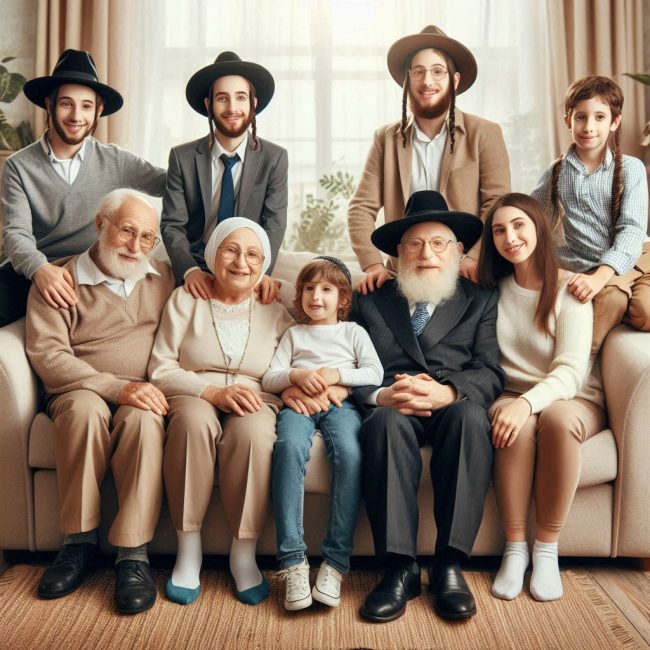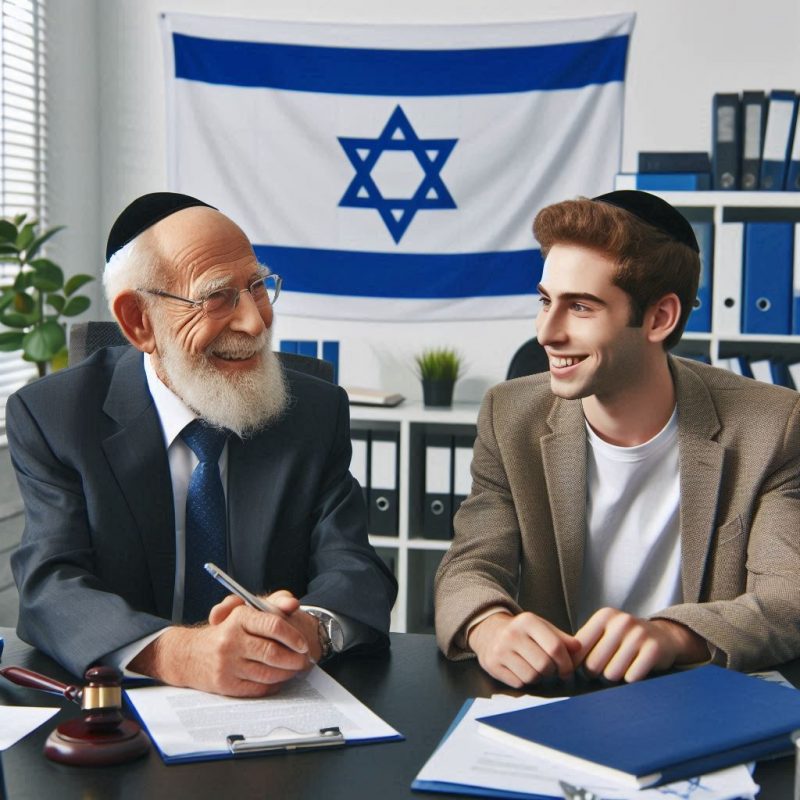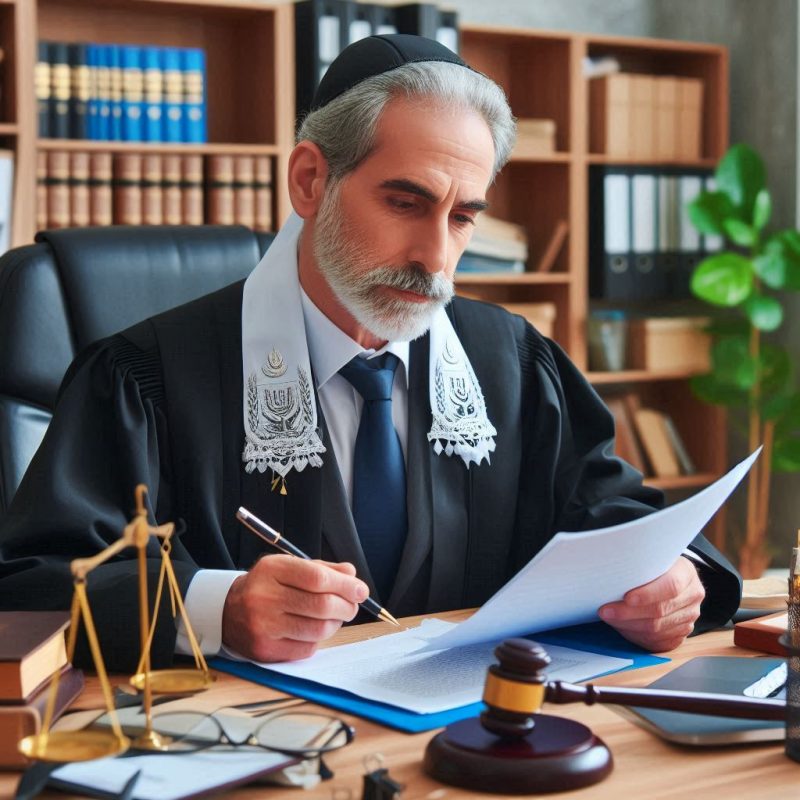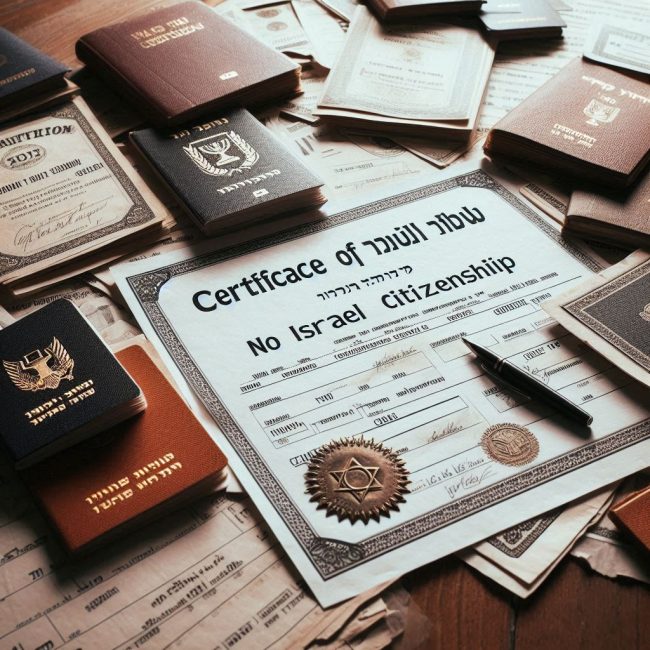Reunification with elderly single parents in Israel
In addition to the topic Reunification with Elderly Single Parents in Israel, we are also very often asked other important legal questions such as:
– How do I bring my parents to Israel?
– What is the STUPRO procedure and how to go about it correctly?
– Entering Israel for foreign parents
– How to get pension and Bituah Leumi for non-Jewish parents in Israel?
– Medical insurance when bringing parents to Israel
– Israeli citizenship for non-Jewish parents
– How to bring my mom from Ukraine to Israel?
Let’s try to answer them and many others.

Why it is worth reuniting with children in Israel
Family is happiness
Family warmth every day! No more loneliness – your children and grandchildren are always close by – the love and laughter of children and grandchildren energize optimism and the desire to live. Communication between an elderly parent and the younger generation is a source of joy and meaning in life, emotional support, love and care of loved ones that help you feel needed and valuable.
It is also a transfer of your wisdom: the opportunity to share your life experience with the younger generation, as well as a sense of success in the continuation of the family: watching the growth and success of your offspring gives you a sense of continuity and your own achievements in raising your offspring. After all, it is all down to your own merit, isn’t it? Communicating with the younger generations also stimulates physical and mental activity, gives you an active lifestyle, does not let you languish in retirement….
The best medicine in the world at your service
Israel’s medicine is rightly considered one of the best in the world for several reasons. These are innovative technologies: Israel is a leader in the development of advanced medical technologies and treatment methods. And highly qualified specialists: doctors undergo rigorous training and constantly improve their skills. Interdisciplinary approach: complex treatment is practiced with the participation of specialists from different fields. Scientific research: active clinical trials and implementation of the latest techniques. Modern equipment: clinics are equipped with the most advanced diagnostic and treatment equipment. Highest survival rates: especially in oncology and cardiology. Short waiting times: forget about long waiting lists and unaffordable treatment, especially if that is what you had in your country of origin…
Israeli medicine is internationally recognized – many Israeli hospitals and doctors are world renowned and number one in the world by many measures.” Reuniting with elderly single parents in Israel will allow you to enjoy all its benefits…
Comfortable climate all year round
Israel offers a wonderful climate that makes it an attractive place to live and vacation all year round. Enjoy the warmth and sunshine of the Mediterranean!
These are warm, dry summers and mild winters. An abundance of sunny days, of which there are more than 300 a year. Comfortable temperatures: average 25-30°C in summer and 10-20°C in winter. Long beach season: from April to October you can enjoy the sea. Variety of climatic zones: from coastal plains to mountainous areas. Low humidity: especially in the central and southern regions, making the heat more tolerable. Mild winters: snow is rare except in the mountainous areas. This is an extremely favorable environment for the elderly, as the warm climate makes life easier for people with joint diseases.
Israel gives its residents the ideal conditions for an active lifestyle, sport, recreation or work.
State support
Israel offers substantial state support to elderly parents who have reunited with their children. These include health insurance, social security, eligibility for old-age benefits after a certain period of residence, disability benefits (if there is a disability), integration programs providing free or subsidized Hebrew courses (ulpanas) for new immigrants. The long list also includes housing benefits, which allow for rental assistance or subsidies to buy a home. Transportation benefits, i.e. discounts on public transportation for the elderly. Many cultural programs and activities for seniors, as well as entire senior centers: day care centers offering activities and social interaction. Home care: support programs for seniors in need of care. Tax benefits: certain tax breaks for older immigrants. The list of benefits is, of course, much broader than the one listed here, and is handled by Bituah Leumi, an organization with offices throughout Israel.
Legal protection: laws that protect the rights of older people and prevent discrimination.
Don’t miss the chance to spend your golden years with your loving family! Reunification in Israel is an investment in a happy future for you and your loved ones.

How do I reunite with my child in Israel?
Under existing laws, Israelis have the right to reunite with their elderly parent (this family reunification procedure may often appear under the name STUPRO). There is a family reunification procedure that is regulated by the Ministry of Interior and other governmental bodies. Reunification with elderly single parents in Israel and other family members is only possible for persons with Israeli citizenship. Otherwise, those who wish to bring their immediate relatives living abroad will not be able to do so.
Thus, a father or mother can come to Israel to visit his or her child and obtain permanent residency status, including a number of benefits that are available to the rest of the country. These include social benefits from Bituah LeumiThese include social benefits from Bituach Leumi, full access to the health care system, work permits and many others.
Legalization of a single elderly parent in Israel. Main provisions.
The Law on Family Reunification of Elderly Parents in Israel aims to facilitate the immigration of elderly parents of Israeli citizens.
A brief summary of the main provisions of the law:
Nationality of children
Inviting children (son or daughter) are required to have Israeli citizenship in order to qualify for reunification with an elderly or aged parent.
Center of Life in Israel
Children are required to reside permanently in Israel and have a so-called “center of life” in Israel. It is often necessary to confirm the availability of suitable housing in Israel for a child in order to have the right to call an elderly single parent.
Proof of parentage
There must be proof of direct parental relationship between the children and the parents.
Financial dependence
Parents must prove that they are financially dependent on their children in Israel. In turn, the children must be able to provide them with guarantees in Israel: housing, health insurance, and all other needs of the elderly person.
No right of repatriation
The visiting parent may not have the right to repatriate to Israel based on the “Law of Return”.
Choice of only one parent
Only one elderly parent can be chosen for reunification: only the mother or only the father if they are unmarried or divorced.
Age of the parents
Age of the mother is over 62 years old. Father’s age is over 64 years old.
Family status of the parent
In accordance with the law Noal ore kashish ve boded.The elderly parent must be single, i.e.: single, divorced, widow or widower and have no other children. Or all of his/her children must be legally residing in Israel.
Parent’s health
The parent must not have a serious health condition that could pose a threat to public health.
Criminal record
A certificate of no criminal record of the visiting parent is required (it is important to remember that Israeli citizenship is possible even with a criminal record).
Absence of other children
When reuniting with a single parent, the Israeli Ministry of Interior requires that the parent has a child or all children residing and holding Israeli citizenship. In exceptional cases, the case is referred to a humanitarian commission.
Integration
Willingness to integrate the visiting parent into Israeli society, including learning Hebrew.
Renunciation of citizenship
When a parent applies for Israeli citizenship, he or she automatically renounces the previous citizenship of the country of origin. Exceptions are made for parents of enlisted soldiers who have completed active army service in the Tzahal Armed Forces.
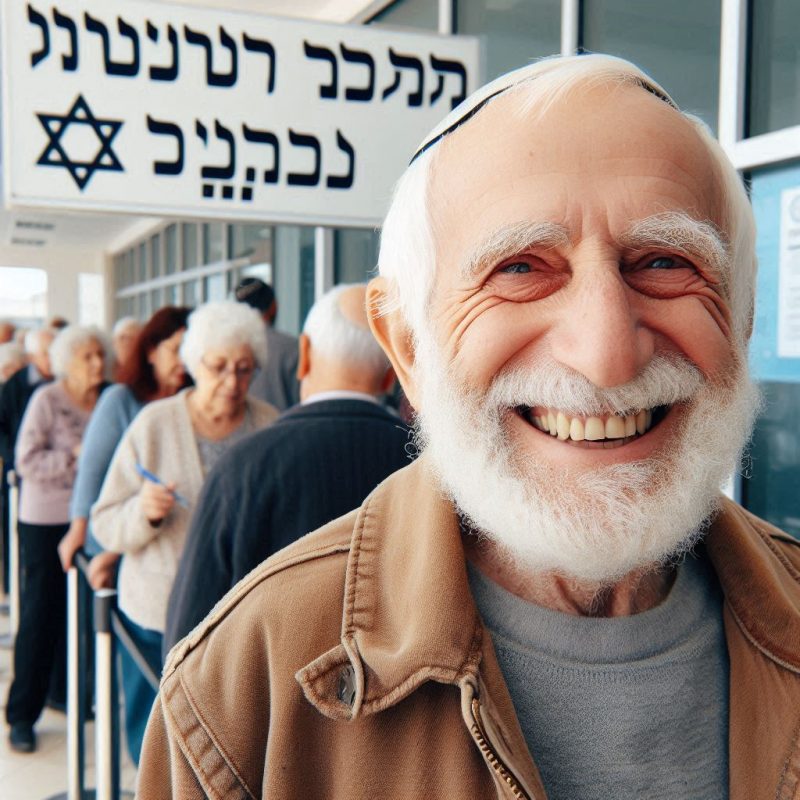
How much does it cost to reunite with elderly single parents in Israel?
The process of family reunification in Israel involves various fees and expenses. Here are the main financial aspects that applicants face:
1. Government fees:
– Visa application fee: NIS 190
– Additional “intervisa” for entry into Israel: NIS 190
– Visa renewal: NIS 190
2. Translation and notarization of documents:
– Translation and notarization of documents: from NIS 500 (depends on the language of translation and number of characters)
3. Legal services:
– If you need the assistance of an immigration lawyer in the application process and further consideration of the case, the cost of such services may vary and may range from 10000 to 40000 NIS, depending on the complexity of the case and the stages of presentation to the Ministry of Interior.
4. Health insurance:
– Compulsory health insurance: from 200 to 1000 NIS per month, depending on age and health status
5. Travel and accommodation:
– Costs for travel to Israel for interviews and paperwork. May vary.
6. Residence permit applications
– Applying for permanent residency: from NIS 800 (prices are constantly changing).
– Applying for citizenship
– The final step in applying for citizenship: the fee is usually 900 NIS (prices are constantly changing).
7. Additional costs:
– Additional documents (requesting, translation, certification)
– Transportation costs (travel to interviews)
– Courier and postal services, sending documents, receiving official rulings
The total cost of the process can vary greatly depending on the specific situation, but typically ranges from 10,000 to 50,000 shekels (approximately $3,000 to $15,000) or more.
Note that:
• Prices are subject to change and depend on individual circumstances.
• Some expenses are non-recurring, others are recurring.
• The process can take several years, which adds to the overall cost.
• State fees are not refundable in the event of a waiver.
It is advisable to prepare a budget in advance and consider the possibility of unforeseen expenses during the family reunification process.
______________________________
IMPORTANT: All of the above prices are market averages and can vary significantly, as can the cost of attorneys in the Israeli market. Unfortunately, reunification with an elderly parent in Israel is a type of procedure that does not provide the applicant with a free lawyer. He is sometimes entitled only in case of refusal or appeal against the decision of higher authorities in exceptional cases. Our advice is that it is better not to bring the case to the point of rejection and to consult on your case in advance. You can always get “Free Legal Advice in Israel” or seek help from the lawyers at the Law Office of Reznikov & Associates: Our Contacts
______________________________
Difficulties and problems during the procedure. What to be morally prepared for.
At the end of our material we cannot fail to mention that not every family starting the reunification procedure is aware of the fact that even at the stage of application the Ministry of Internal Affairs may decide to close the case. This happens if the necessary documents are missing, incorrectly certified or submitted in the wrong form. Thus, any mistake made during the procedure and a negative result of the consideration of the application may have the most unfavorable legal consequences for you and your relatives.
That’s why an attorney plays a key role in this process:
1. Complex and confusing laws
Israeli law regarding immigration, family reunification, and family law in general, is very complex and constantly changing. Citizenship laws, return laws, temporary regulations and rules can be difficult to understand without a legal background. Providing multiple documents is nearly impossible if members live in different countries and do not understand the laws.
• Navigating the law: A lawyer will help you understand the laws, decrees and regulations that apply to the applicant’s particular case. He or she will be able to interpret the law correctly and explain what the applicant’s actual rights and options are. A simple example: obtaining Israeli citizenship in the absence of a birth certificate. Even this is possible, thanks to a lawyer.
2. Bureaucratic hurdles and the application process
The list of documents to be submitted to the Ministry of Interior in connection with the procedure of Reunification with Elderly Single Parents in Israel is impressive. The first set of documents the invitee will have to collect in his home country, the second set of documents will have to be submitted by the inviting Israeli citizen. Some certificates and certificates must be submitted with an apostille and notarized, otherwise they will not be recognized. It should be remembered that the Ministry of Interior officer dealing with the case, in individual cases has the right to request a number of documents that are not mentioned in the standard list.
• Proper execution of documents: The lawyer will ensure the correct execution of all necessary documents, will avoid errors and delays associated with incorrect filling out of forms.
3. The elderly parent has other children
One of the most common problems encountered in the case of reunification with an elderly parent is that he or she may have other children living in third countries. Often, these relationships have long been broken, but, by law, it is impossible to take advantage of the procedure. At this point, a reasonable question arises: where in this case, where are the very principles of humanity, which are mentioned by the Supreme Court of Israel? Where is the help for an elderly person in the most difficult life situation? Alas, in the vast majority of cases, the Ministry of Interior immediately refuses to consider the application because the parent does not meet the requirements of the procedure. There is a way out.
• The work of a lawyer is a war: In the puffy folders of won cases of real professionals from solid law offices dozens of complex cases, for which there was a fight not for life, but for death, to prove to the authorities that the very humanity exists and justice must prevail. A good lawyer will not allow tragedy, he will turn a hopeless case into a touching story of family reunion with a happy ending.
4. Security checks and other legal complexities
One of the main reasons for refusing family reunification is security considerations. Israel attaches great importance to security issues, especially in cases where the applicant or his/her family resides in high-risk areas or in separate countries. This may lead to the denial of applications based on possible threats to national security. Any suspected association with undesirable organizations or involvement in activities that threaten Israel’s security may result in rejection of the application or lengthy delays.
• Dealing with security checks: The lawyer knows how to minimize the risks of refusal based on security risks and will be able to prepare the necessary documents and evidence to convince the authorities that there are no threats. Also, even in the case of a seemingly hopeless situation, such as a criminal record, the lawyer can help finalize the procedure.
5. Biometric data and interview
Not every applicant for family reunification realizes that he or she and his or her parents may face additional requirements from the verification authorities. It is, for example, the need to provide biometric data, to take DNA tests to prove kinship, or to undergo a complicated interview more like an interrogation. Not everyone is morally prepared for such surprises.
• Support, preparation, answers to questions: The services of a professional lawyer specializing in family reunification in Israel can significantly increase the chances of success for applicants. The lawyer will advise on which laboratories are recognized by the official authorities, help draft a special application for the Family Court in Israel when submitting a paternity test, provide detailed consultations so that applicants are fully prepared for the interview, help applicants practice answering the most difficult questions. May personally attend the interview and help communicate with the official.
6. Social and economic difficulties
Waiting for a decision on the application may lead to temporary separation of the family, resulting in psychological stress and financial problems. Persons awaiting reunification may be denied employment and government benefits, causing a host of difficulties. There are also restrictions on access to services. In the case of successful reunification, family members who have not obtained full citizenship may face restrictions in accessing health care, education and other social support.
• Obtaining temporary authorizations: Social restrictions, such as limited access to health care, education, or employment rights, are often associated with uncertain status. An advocate can take steps to obtain temporary permits or statuses that can provide the visiting parent with access to basic social services.
7. Appeals and challenges to refusals
If the application for family reunification is rejected, the applicant must appeal or challenge the decision in court. The appeal process can be complex and requires a thorough knowledge of the laws and procedures.
• Conducting cases in court: The lawyer will be able to professionally prepare an appeal and represent the interests of the applicant in court, which significantly increases the chances of success.
8. Personalized approach to business
Each family reunification case is unique and requires a customized approach. Different cases may require different strategies and tactics.
• Strategy development: The lawyer will develop a customized strategy for the specific case, taking into account all legal nuances and potential obstacles.
9. Risks of loss of status or citizenship
If the applicant or his relatives already reside in Israel, there are risks associated with the loss of residency status or even citizenship in the event of a mistake or violation of the requirements.
• Protection of Rights and Status: An attorney will help protect the applicant’s status under the law on Reunification with Elderly Single Parents in Israel, ensure compliance with all requirements to avoid loss of residency or citizenship rights.
10. Efficiency and speed of the process
The family reunification process can drag on for years, especially if the applicant tries to solve everything on his/her own, without legal support.
• Speeding up the process: An attorney can speed up the process because he or she knows how to avoid typical delays and problems and can respond promptly to requests from authorities.
11. International and intercultural aspects
If the family reunification process involves different countries, including the Palestinian territories, or international aspects (countries and regions where hostilities are ongoing at the time of application), an attorney can help sort out additional legal requirements and possible obstacles.
• Legal support in international matters: A lawyer with experience in international law can help solve problems related to other countries’ legal systems and cross-cultural nuances. Can use certain aspects as a bargaining chip in pursuing a case.
12. Psychological and emotional aspect
Prolonged waiting and uncertainty can put serious pressure on the family, causing psychological and emotional problems. This is especially true for children, who may be stressed by the separation from one of their parents. These problems make the process of family reunification in Israel exhausting and time-consuming
• Giving confidence, clarifying processes, setting realistic expectations: A lawyer, although not a psychologist, can sometimes help even more than the latter. Interaction with a professional who is professional, confident and calm helps the family feel supported not only on a legal level, but also on an emotional level. Sometimes stress arises from unrealistic expectations or ignorance of realistic timelines and possible outcomes. An attorney can address these issues, helping the family better prepare for possible scenarios.
Why it is worth hiring a lawyer to reunite with elderly single parents in Israel
As you have already realized from all of the above, even collecting all the necessary documents and following all the instructions of the procedure does not guarantee that your application will be approved. But it should be remembered that the refusal of the consul or the migration service is not the end of everything you have started and dreamed of. It is only a formal position of a particular agency and cannot be considered a final and irrevocable verdict.
The Israeli Supreme Court has repeatedly emphasized that the Ministry of Interior’s directive on the reunification of elderly single parents in Israel and the granting of status to them whose children reside in the country, should facilitate the reunification of families in difficult circumstances, in accordance with the principles of the highest humanity. This is also confirmed by Israeli Administrative Law, which has always been guided by the principles of “elasticity” and the preference of content over form.
There are countless cases in Israeli law in which the Supreme Court has repeatedly issued rulings that, due to special circumstances, ordered the state to grant status to elderly Israeli parents even if they have other children. There are also cases in which, in accordance with the same principles of humanism, the court has forced the authorities to abandon literalism and formalism, granting the right of reunification to parents who did not meet the return criteria set forth in the law, but who were in a very difficult life situation.
Thus, the Supreme Court has the final word on appeals and judicial reversal of decisions. Of course, not all situations can be resolved and not every ruling of the Ministry of Internal Affairs or Nativa can be canceled, but if you do not fight, you can lose everything. That is why it is worth turning to professionals, whose experience and stubbornness, as well as mastery of administrative and judicial procedure, correct application of existing precedents, foresight and calculation have more than once made it possible to win the case.
Without the help of such lawyers, who understand civil, immigration law and aspects of the work of the Ministry of Internal Affairs, it is virtually impossible to challenge the decisions of the Migration Service and other agencies.
Full text of the law: “Granting status to an elderly single parent in Israel” – “Noal ore kashish ve boded”
We publish the full text of the law on Reunification with Elderly Single Parents in Israel in English.
– From it you will learn what happens if a relative who invites a parent has Israeli citizenship but does not live in Israel permanently!
– What happens if a parent stays illegally in the State of Israel for a long period of time!
– What if in the past the parent has had problems entering Israel or obtaining any status in Israel…..
– What if a parent had a criminal record and did not submit a certificate of no criminal record with proper certification and apostille…
And much more…
The full text of the law can be found on our website by clicking here: Law: “Granting Status to an Elderly Single Parent in Israel” (Noal ore kashish ve boded)
______________________
Below you will find a handy navigation box on the topic Family Reunification in Israel.
- Reunification with elderly single parents in Israel
- Law: “Granting status to elderly single parents in Israel”
- Husbands, wives, and same-sex spouses of Israeli citizens (STUPRO procedure)
- Status for parents of soldiers in Israel
- Children from previous marriages in Israel (STUPRO procedure)
- Inviting grandparents to Israel
- Israeli citizenship for minor children of non-Jewish spouses of Jews
- Israeli citizenship for widows or widowers of Jews
- Israeli citizenship for children born out of wedlock
- Humanitarian visa for Israel
